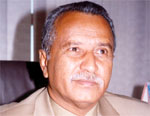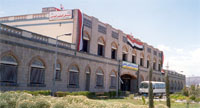
Prof. Quassim Berihe to Yemen Times:”What I want is achievement and not just a routine management of the faculties” [Archives:2004/699/Education]
January 1 2004
 |
  |
DT: When and where were you born?
QB: I was born in Hodeidah in 1954.
DT: What was the status of your family at the time of your childhood?
QB: I was born in a poor family. My father was blind, and it was my mother who looked after me and brought me up. If I have achieved anything in life, the credit goes very largely to my mother.
DT: You should be proud of the fact that although you were born in a poor family, you have risen to the status of the President of a government university and have so many achievements to your credit. You have proved that if one has a spark in him, poverty cannot stand in his way. Now, tell us something of your educational background.
QB: I graduated from the Faculty of Commerce in Sana'a University in 1978. I got my Master's degree from Eastern Michigan University in 1981, and my PhD degree from Florida State University in 1985. The topic of my PhD thesis was: Financing of Educational System in Yemen.
DT: Tell us something about your administrative career.
QB: I became the founder Dean of the Faculty of Education in Hodeidah in 1987, and became the founder President of Hodeidah University in 1996.
DT: What do you consider to be your prime achievements as the Dean of the Faculty of Education in Hodeidah?
QB: I started the Faculty in a small office room with only two members of the office staff and only three teachers. Two of these teachers were Egyptians, one in physics and the other in mathematics, and only one Yemeni teacher in Islamic studies. And then the Faculty developed so strongly as to be raised to the status of an independent University in the year1996.
DT: What were your main achievements as the President of Hodeidah University?
QB: My achievements as the President of Hodeidah University are very large in number.
(i) I got a compound wall erected for the University campus. It may not sound like a big achievement, but it really meant a lot of doing.
(ii) I created ten faculties, and got buildings erected for eight of these ten faculties. I established the Faculty of Physical Education, Faculty of Fine Arts, Faculty of Marine Science and the Faculty of Computer Science. These faculties did not exist in Yemen. They were, for the first time, established in Hodeidah.
(iii) As the founder Dean of the Faculty, I started with only 70 students. When I left Hodeidah University as its President, there were as many as 18,000 students and 340 Yemeni teachers. As I told you earlier, I started the Faculty of Education with only two members of the office staff, but when I left Hodeidah as its President, there were as many as 350 members of the office staff.
(iv) I started the Center for Social Service.
(v) I started the Regional Medical Service (Tubal Manateeb).
(vi) I established the Center for Medicinal Herbs for which I got plants from different parts of the world. I got some medicinal plants from India also, and some others from Oman.
(vii) In addition to the above-mentioned eight Faculty buildings, buildings for the central administrative offices were also constructed.
DT: These are really marvellous achievements in such a short time, but which of these would you personally rate as your highest achievement?
QB: In my opinion, my highest achievement was establishing faculties not in existence anywhere else in Yemen, and then pooling the resources for providing the necessary infrastructure and the required human support. The result was that I became a kind of father figure for everyone involved in these faculties.
DT: The administrative and teaching staff in Hodeidah and also the people involved and interested in the educational development of that city say that they all miss you a great deal. Do you also miss Hodeidah?
QB: I also miss them very much, particularly the teachers, and the members of the University supporting staff.
DT: Hodeidah is known for its terribly hot and uncomfortable weather, and Dhamar is known for its moderate weather in summer, and its cold weather in winter. Climate-wise, how do you like this change from Dhamar?
QB: I studied in extreme climates in the United States. Florida was very hot, but Michigan was very cold. I never considered weather to be a challenge in my life. I believe in doing my work with sincerity and dedication, irrespective of the weather. The weather has never been an important factor in my life.
DT: I've always known you as a highly dynamic administrator with an extraordinary drive and urge for accomplishments. What is a loss to Hodeidah is a gain to Dhamar. Now what are your plans for developing Dhamar University?
QB: Before I specify my plans for developing Dhamar University, I would like to put on record my sincere appreciation and thanks to my predecessor Dr. Abdullah Mujahid in Dhamar University for doing a great deal of planning and also for what he has already done. He did a lot and I have now to start where he left. My plans are as follows.
(i) I want to extend and strengthen the infrastructure of the University inside the campus earmarked for it.
(ii) I want to provide to each Faculty the degree of autonomy necessary for good-quality academic work to be accomplished in the shortest possible time.
(iii) I want to have a cordial and meaningful give-and-take relationship of mutual support with the society around Dhamar University. I had a warm and cordial relationship with the Governor of Hodeidah and also with its citizens. This kind of relationship is, in my view, extremely important for any university to achieve great heights of excellence. I'm looking forward to having the best possible relationship with the Governor and the people of Dhamar as I had in Hodeidah.
(iv) One of my aims is to attract competent Yemeni academicians to this University without any compromise with quality. I hereby appeal to the Yemeni teachers and office staff and also the expatriate teachers of this University to acquit themselves in such a way that we can soon attain great heights of excellence and glory for this University.
(v) Another aim of mine is to develop the hospital Ma'abar in such a way that it can prove to be the best hospital in Yemen and one of the best hospitals in the Arab world. It has a large stock of sophisticated and expensive medical equipment. What we need are medical experts to make the best possible use of the equipment. I want to structure this hospital in such a way that it can be financially self-sufficient as far as possible.
I hope and pray that I will continue to get necessary support from the government, and particularly from the President of the Republic and the Prime Minister to be able to realize my dreams.
DT: What do you consider to be your top priority/priorities in your plans for developing this University?
QB: My top priority is to have a large, properly equipped building for each Faculty.
DT: For the growth and development of this University, you may be thinking of certain administrative reforms. If this is true, what are the administrative reforms you have in mind?
QB: I want to assign a good enough budget to every Faculty, so that they do not need to come to me for every small sanction. I want the dean and the vice-dean of every Faculty to exercise their own dynamism and leadership for the growth of the Faculty. They will have from me all the support they need as the head of the institution. What I want is achievement and not just a routine management of the Faculties.
DT: I know that for a man of your vision as the President of a University each Faculty is equally important in its own right, but it is likely that you will develop certain selected faculties on the basis of slightly greater priorities. If yes, what are the Faculties likely to receive greater attention during the coming few years.
QB: Developing the Faculty of Medicine and the Faculty of Dentistry needs a little more attention than the other faculties. But each Faculty needs to develop and each Faculty will have my whole-hearted support for its development plans.
DT: The University of Sana'a is your parent University, and the University of Hodeidah is a University of great achievements for you in the recent past. What kind of relationship with these two universities would you like to have during the coming few years?
QB: I want to make Dhamar University financially and administratively like Sana'a. My hope is that some faculties in Dhamar University, if not all, will develop faster than certain parallel faculties in Sana'a which have reached a point of saturation. I would, however, welcome a meaningful academic exchange between all universities in Yemen, particularly between these three universities in which I have been actively involved.
DT: Is there anything else that you would like to add on your own at the end of this interview?
QB: I solicit the help and cooperation and moral support of everyone in and around Dhamar, particularly of those interested in the educational development of Yemen in general and of Dhamar in particular. I invite not only support and appreciation, but also the creative criticism necessary for all of us to be proud of making this an ideal university.
——
[archive-e:699-v:13-y:2004-d:2004-01-01-p:education]


